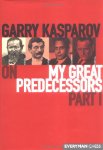
Who are you, and what do you do?
I am Natalia Pogonina - a grandmaster, member of the Russian national team and an Olympic chess champion. I make a living by traveling all over the world and doing what I love most – playing chess! You can find out more about me at pogonina.com or at my Wikipedia page. Also, feel free to ask me a question on Twitter: @Pogonina. I hope to hear from you soon! :)
What books have influenced you the most?
My favorite author is Antoine de Saint-Exupéry. I share his passion for airplanes and, more importantly, highly value the combination of strength of mind, wisdom and kindness.
The saying “a man is what he eats” can be applied to chess literature too – swallow a second-rate scribble written for the sake of earning easy money, and you may not only waste a lot of time, but form wrong perceptions of the game, its principles and players. On the contrary, some writers put soul into their books and try to do their best to help the readers increase their chess level and (importantly) gain pleasure during the process.
As to chess books: here is a collection of titles that have affected me most when I was a junior player. Among the others:
What book would you like to write?
My first project in literature was “Chess Kamasutra”, which has received quite a lot of attention from the media. However, the topic of analogies between sex and chess has proved to be so inexhaustible and sophisticated that I haven’t really finalized the manuscript.
The second book had a production title “Chess exposed by grandmaster Natalia Pogonina”. It can be described as a guide about chess that covers all sorts of topics related to the game and the people who play it. I am still not sure whether to publish it or not.
Also, in the future I am hoping to become more experienced and proficient in the field of chess psychology and to write a good book about it. The way it is now, most people tend to have a very biased and limited notion about psychology in chess: they either view it as a set of cheap tricks aimed at unsettling the opponent, or ignore this aspect altogether by quoting Bobby Fischer’s famous line: “I don’t believe in psychology. I believe in good moves”. Actually, this statement has little in common with the way Fischer acted himself, so it was more of a flashy motto than a real principle worth following. Also, I would like to suggest a totally different attitude towards the game and life in general, which has nothing to do with all those slogans like “break a man’s ego”, “be prepared to kill people over the board”, and other means of trying to prove one’s worth by diminishing other people’s achievements’; hindering their self-fulfillment; demoralizing them. What attitiude am I advocating? You will find out one day! ;)


